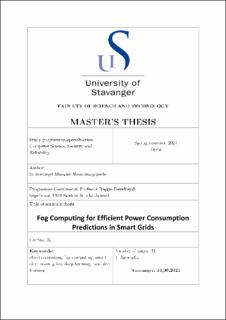| dc.description.abstract | Cloud Computing provides on-demand computing services like software, networking, storage, analytics, and so on over the Internet. However, the explosion of the Internet of Things (IoT) devices and the high volume and variety of data generated by these devices, is creating challenges in handling large and rapid computations. Such challenges require a reliable and secure system with low latency. Fog Computing is a promising solution to address these challenges. The approach allocates tasks down to devices that are closer to the sensors which will provide immediate feedback to systems of time sensitive IoT applications. Latency, location awareness and highly virtualized computational models are some of the advantages that Fog Computing has over Cloud Computing. In this thesis work, smart grid is used as a use case. Power consumption prediction was used as a task to perform model training and prediction. In addition, comparisons of the mathematical models were performed to find out which of the models perform better in providing sound predictions and which models are better in resource usage. Finally, the computations were performed on both Fog and Cloud devices to compare CPU time and memory usages of the models in each device. | |
